Saturday, June 25, 2011
 6:41 PM |
Launch of The Anvil Jose Rizal Reader
6:41 PM |
Launch of The Anvil Jose Rizal Reader
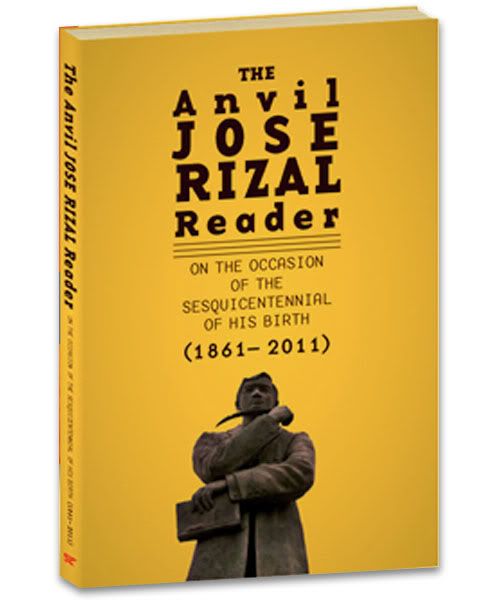 The Anvil Jose Rizal Reader will be launched July 2, Saturday at 4:30 PM at the Filipinas Heritage Library in Makati. The book includes contributions from Frances Alcarez, Christine Bellen, Susie Baclagon-Borrero, Jomar Bulda, Ian Rosales Casocot, Joel Chua, Adrian E. Cristobal, Randy S. David, Conrado de Quiros, Rommel Estanislao, Aaron Felizmenio, Jann Galino, Barbara C. Gonzalez, Ernest Hernandez, Patricia Laurel, Vivian N. Limpin, Mario I. Miclat, Ruben Nacion, Vim Nadera, Ambeth R. Ocampo, Elbert Or, Bryan Anthony C. Paraiso, Vicente L. Rafael, E. San Juan Jr., Randy Valiente, and Rene O. Villanueva. My contribution is my sci-fi piece “The Pepe Report,” which is also included in Heartbreak & Magic: Stories of Fantasy and Horror, also out from Anvil this year.
The Anvil Jose Rizal Reader will be launched July 2, Saturday at 4:30 PM at the Filipinas Heritage Library in Makati. The book includes contributions from Frances Alcarez, Christine Bellen, Susie Baclagon-Borrero, Jomar Bulda, Ian Rosales Casocot, Joel Chua, Adrian E. Cristobal, Randy S. David, Conrado de Quiros, Rommel Estanislao, Aaron Felizmenio, Jann Galino, Barbara C. Gonzalez, Ernest Hernandez, Patricia Laurel, Vivian N. Limpin, Mario I. Miclat, Ruben Nacion, Vim Nadera, Ambeth R. Ocampo, Elbert Or, Bryan Anthony C. Paraiso, Vicente L. Rafael, E. San Juan Jr., Randy Valiente, and Rene O. Villanueva. My contribution is my sci-fi piece “The Pepe Report,” which is also included in Heartbreak & Magic: Stories of Fantasy and Horror, also out from Anvil this year.Labels: books, history, people, philippine literature
[0] This is Where You Bite the Sandwich
 5:32 PM |
A Decade of Sound and Dancing (and Zombie) on Hump Day
5:32 PM |
A Decade of Sound and Dancing (and Zombie) on Hump Day
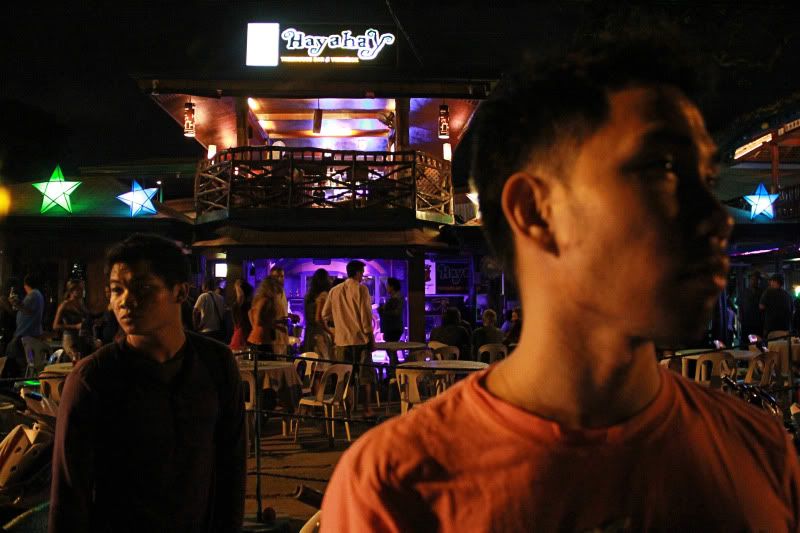
You could not escape the tenth anniversary of Reggae Wednesday at Hayahay last June 22.
Passing by Escaño, with a view of Tañon Strait dark as the night, you would not miss, for one thing, the beat and strum of local reggae bands carrying on from early evening what has become almost a tradition of this kind of sound. And for this special night, the bands were pledging their talent fees for a cause, the amount raised matched by Hayahay, with the proceeds going to various soup kitchens around town.
There was, for another thing, that sense of inevitability of a celebration. Already a regular party date on everyone’s weekly calendar (which jumpstarts, one might say, the young Dumaguete crowd’s love affair for a long weekend of surf, sound, and Zombie), celebrating Reggae Wednesday’s almost unbelievable turn a decade older was an excuse to even party harder. As Enchi’s lead singer Bembem Timtim remarked onstage before segueing to the band’s first number around midnight for the anniversary jam: “Who would have thought? Who would have thought that ten years would pass, and we’d still be here doing Reggae Wednesday?”
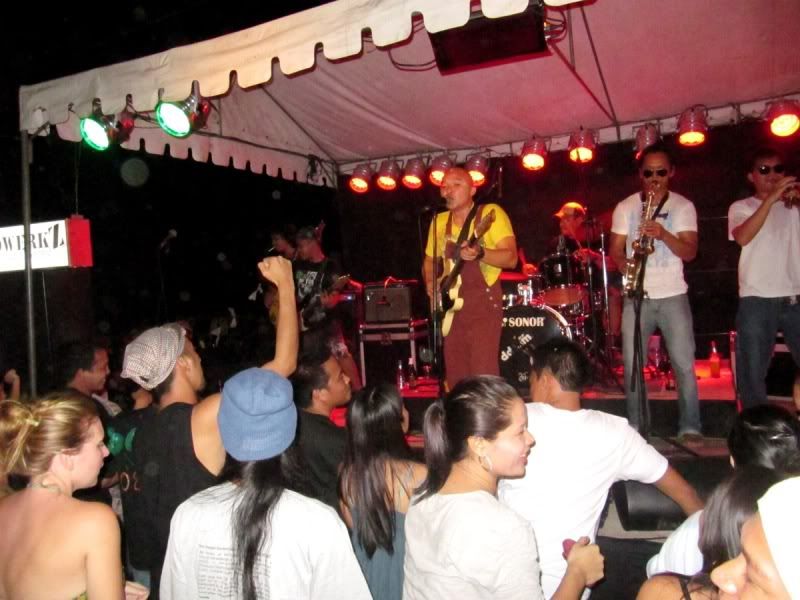
If you think about it, RW has indeed become an institution of sorts, and almost despite itself, too. Here is a perfect confluence of youthful rebellion, bohemian schtick, endless booze, alternative music, and frenetic dancing—and it has lasted this long. Ten years.
Who would have thought?Thus, a week before festivities even began on that stretch of party called Escaño Boulevard, the tongues were wagging in excitement around town, even as far as Facebook wall shoutouts: “Reggae Wednesday is ten years old!” And so we all went to celebrate. Enchi was playing after all, Bembem being in town from Singapore—and it has been quite a while since we last heard them play together.
You could not escape the RW anniversary anyway. Even when you chose to stay home that Wednesday night, or to stay away hostaged by faraway geography, the whole night was streaming live on video feed in the Internet. Reggae Wednesday has invaded the interwebs, and has indeed entered the digital age.
Who would have thought?But to flashback to 2001, when it all began.
There was no streaming video then. And no one thought it would last ten years. And the whole thing began, curiously enough, on a Monday.
Or at least, the first informal gig was planned for a Monday, with a bunch of friends fiddling with time, alcohol, and the search for an appropriate space to jam. All they wanted was that space—and the best time possible—for a bunch of friends to come together for a musical jam of sorts. “They” included Sande Fuentes and a bunch of his friends from both high school and college days: JM Abregana, Bembem Timtim, JJ Amparo, Gabby Flores, Oswald Singson, Kim Zerrudo, and some other buddies. “We just wanted a place to play music regularly, and back then,” Sande recalls, “the repertoire we used to play a lot consisted of Bob Marley, Sublime, 311… Mostly reggae, but with lot of punk and ska thrown in.”
One particular drinking weekend at Hayahay (which Sande now manages for the family), they all decided to give it a go. On a Monday.
“It was supposed to be Reggae Monday,” Sande says with a laugh, “but everybody was hung-over that Monday, and the easy excuse was: ‘Let’s do it mid-week.’ Do it during Hump Night Wednesday, and then we roll through towards the weekend.”
The plan was then set for Wednesday, certainly considering hangover recovery time. “We did a text brigade,” Sande recalls, “and I drew the announcement on paper napkins and we photocopied them and gave them away as flyers to a bunch to friends to distribute. A bunch of them helped. There were our El Amigo and Memento friends like Babu Wenceslao… The Cuernos de Negros boys… Micky Ybañez… There are too many to mention. A lot of friends helped us and supported us in the beginning.”
Enchi then played every other Wednesday, “and they played on the stage that is right next to the Hayahay restrooms now, beside the aquarium…,” Sande says. After the gig, the boys in the band would chip-in money for drinks, “or whatever else was the choice for the night.” The origin of RW was simply just a pursuit of fun and shared music among friends.
But the whole endeavor soon grew, bit by bit. Enchi and Reggae Wednesday veritably started the music scene for Hayahay, and they then added the Friday lineup with Kakay and the H Project playing jazz. Then there was Saturday Rock with Tracy Teves’ Last Train. And soon, San Miguel was sponsoring the Philippines’ top reggae bands to perform in Dumaguete, from Myra Ruaros-Brownbeat All Stars, Tropical Depression, Junior Kilat, Brownman Revival, and others.
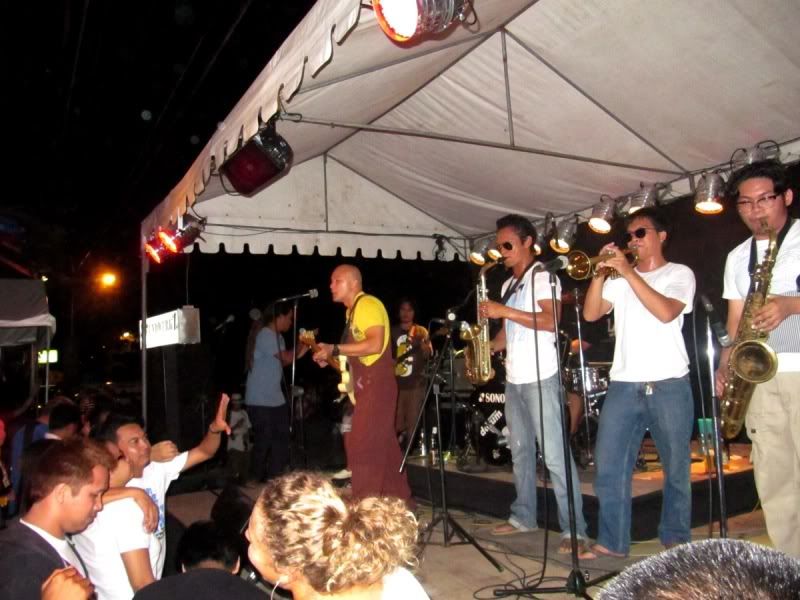
“And thanks to our music friends from abroad,” Sande said, “we got our first international act with dancehall reggae phenomenon Lexie Lee from Los Angeles.” She was doing an Asian tour that included Vietnam and Thailand in 2009, and was more than happy to tuck Manila and Dumaguete in as stopovers. “Our second international act was Malaysia’s Pure Vibracion,” Sande said. “All these musicians and bands gracing our stage encouraged us to keep on playing uncompromised music—and hopefully bring to Dumagueteños even just a small sample of what’s out there musically. Recently, we have brought here some super bands from Manila, like Franco, Urban Dub, and veteran rockers Razorback.”
And what of the immediate future?
"We’re going to have Thursday Eargasm with With DJ Devnic,” Sande says, “and we will be have a peek at underground music scene for techno, house, and tribal beats.”
And Reggae Wednesday?
Easy enough to answer: it’s here to stay, as long as the take remains fresh. And Dumaguete is still willing to rock to the vibes of this sound. Perhaps for another ten years. Ten years.
Who would have thought?Photo of Hayahay by Hersley-Ven Casero. Photos of Enchi by Earnest Hope TinambacanLabels: dance, dumaguete, friends, music, negros, night life
[0] This is Where You Bite the Sandwich
Friday, June 24, 2011
 5:16 AM |
Some Sadness
5:16 AM |
Some Sadness
It is the break of another dawn in a strange week, half of which was spent in a feverish state, and I can’t sleep. Somewhere out of this tiny room I call my apartment, there will be strays of daylight beginning to show—it is, after all, five o’clock and already parts of the city stir.
In the background, Barber’s
Adagio tries to comfort me, becoming like the morning air.
It is easy to welcome such small embraces of comfort. I have not had such for what seems like days now. Last night, after writing in a café, I walked the streets of the city towards the spot where I knew I would find tricycles to take me home, and the promise of rest. Between the spaces in the stars when I walked, I wept a little, surprising myself. I suddenly felt alone, and the dark asphalt I was treading underlined only the confounding sorrow.
I felt alone. Which wasn't bad in itself—
happiness can sometimes be had even in the solitary—but it was a feeling that came with a twin, and it was abandonment.
I didn’t know why I felt that.
I still feel the same, now, even with the sudden chirping of birds outside. Between the spaces of my breathing, the purring and roaring of motor—tricycles by their sounds—signals that morning traffic has began and the streets are waking.
It has been two hours since I’ve tried to sleep, and I knew there was a fraught stretch of minutes where I must have dozed off, lightly, to be awoken by strange flickering images stuck to my shut eyelids, or by strange glimpses of fluttering things in various corners that disappear upon full focus. I found myself, too, saying tiny prayers all night long—and I don’t know why.
There is no other choice but to wake. There is music now. There is the smell of newly-brewed coffee. So I face another dawn. And I am so tired.
And yet, the constant knowledge I have yet to swallow remains this:
There are things in life that are mysteries not even the heart can begin to understand. For instance, how one can love a man with the strength and certainty of stars, but for all that to receive nothing.
What unfathomable sadness.
Labels: life, love
[1] This is Where You Bite the Sandwich
Saturday, June 18, 2011
 2:55 PM |
My Father in a Measure of Memory
2:55 PM |
My Father in a Measure of Memory

Years ago, I was asked by the writers Gémino H. Abad and Alfred Yuson to submit to an anthology of poetry about fathers and fatherhood in the aptly titled
Father Poems (Anvil, 2004). That project, I think, was timed for a Father’s Day release.
The assignment sounded simple—write about your father—but what I had to struggle with, at least initially, was the sudden uncomfortable confrontation of remembering. And remembering is an act fraught with both reconciliation and recounting of past hurts and disappointments—all the dramas any ordinary family is capable of making.
I knew I was not exactly my father’s son. I say that in the sense of familial intimacy. For the longest time, when I was growing up, he was estranged to me, first geographically, and later on, before he died when I was turning 20, emotionally. He was a distant old man who seemed to me possessed by some dark gravity, and I had no patience to understand his tantrums, why he was the way he was, or what was going on in his mind when he would wake up very early every morning and go around the house while we were still sleeping. Was he measuring out, in the dark and bluish light of dawn, what he had made of life? Did he feel that we were disappointed with him—this man who was once young and vibrant and ambitious and wealthy, but who was finally beaten down by strange circumstances to become, perhaps to his own estimation, a shadow? I was a young man in the twilight of his years, and the young never know any better about the varieties of human experience: I only knew the depths of my own narcissistic apathy and the shared disappointments I could not even begin to chart. My father’s name was Fermin. I carry that name, too. It felt then like a burden—like I was yoked to this man whom I could not understand.
Years later, I would write a short story about him titled “The Hero of the Snore Tango” (available now in my short story collection published by the University of the Philippines Press titled
Beautiful Accidents) and the first few paragraphs of that story constitute something which I have yanked from reality.
I wrote:
When Father died, the family rose to play its parts as kin bereaved with loss, but rehearsed in its grieving. There was no crying, no fretful skirmishes with acknowledging tragedy—we all knew his days had to end some time. We had played his death scene each in our minds all too frequently, in variations of muted drama. I had imagined elaborations of quiet dark dawns and bursts of hysterics—the way Tagalog movies paint us all.
But it all finally came to this: a hurried waking nudge from Mother one early morning, and one sentence fraught with subdued disconsolation:
"’Gâ," she said, "Papa’s not snoring."
We hurried to his room and there he was in bed, mouth slightly open and with eyes closed, his skin already clammy to the touch.
"He’s not breathing," I said, feeling no pulse.
"Is he dead?" Mother asked.
"He’s dead."
"Why don’t you—I don’t know—why don’t you give him CPR, or something?"
"He’s dead."
The rest was my attempt in fiction to understand the man, albeit belatedly. And in retrospect, I think I have. In my growing years, I now understand the unforeseen skirmishes life brings you that can indeed cripple one’s spirit—and I know he must have fought hard and long for honor, for respect, for love.
But I did not understand yet fully all these that afternoon when I got the invitation to write poetry about him. I remember looking at the emailed invitation for what seemed like a long time, and then I sat down in front of a rented computer terminal at Scooby’s San Jose St. and wrote the following:
Because, father, there was no chance to believe
In the impossible: the freshly-dug earth, now
Your home, was mute as was usual, turning away
Even the last howl of mourners coming near.
Their black grieving did not understand, as we did, that
Ties which bound could come loose as the grass that
Would feast on your memory six feet above could, as
Ground swallowed-in the digging for mortal remains.
We are told, as the funeral flowers wilted in the sun, that
Memories should be immortal, but we prayed for no ghosts.
The dead should not speak. We prayed, instead: father, we
Forgive you, for you have sinned. And the burial
Became growing silence as we soon dispersed for lives spent
In battled reflections, the muteness of years bearing down
On children struggling to forget by the bottom of
Beer bottles, or the occasional want for punish. Soon, we
Come, year by year, to some bidding, somehow,
For holy days kept precise—that last excuse—to
Listen to some eternal knell your spirit might tell.
Our candles now burn low to capture some
Semblance of closing, the way the ghostly smoke
Wisp among flowers, down to the carabao grass kept
Trim. We wait, and we wait. And life and silence
Become memories built on flimsy hopes, as they must,
To resound to a kind of winged believing.
And then we learn persistence, by the passing
Of days, that even the living must learn to reclaim
Their dead, to Live, to now close
The prayers with which we can finally love
Our dearly departed.
Imperfect poetry from a fictionist. But still. I think I wrote those lines in white heat, although the poem that originally poured from me is a little different now, after random nights spent revising lines, changing one word or four. What has not changed is the ambiguity I still sometimes feel about the man. But that has mellowed. Life itself has taught me how to understand the man.
And yet I know now that I do love this man despite his frailties. He was human. He was me. In my life he continues to live, and I know I must carry on if I want his memory to live on.
There is a picture of him that I keep on my work table at home. It is a photograph in sepia with white borders. He is a young man there—hair slicked back, face impassive but fierce and handsome, collared shirt carefully pressed—and I am struck by the fact that I very much look like him. That photograph keeps me grounded, and makes me remember that love is real, and that it can endure and even blossom even beyond death.
Father, wherever you are, I salute you.
Labels: family, fiction, holidays, memories, poetry
[1] This is Where You Bite the Sandwich
Friday, June 10, 2011
 4:21 PM |
Nabiyaang Tamawo
4:21 PM |
Nabiyaang Tamawo
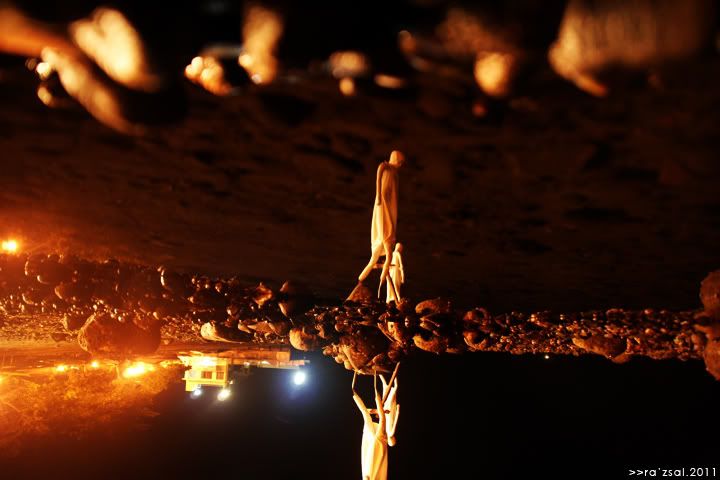
Since last Sunday night, there are spectral figures wading the shallows off the Boulevard in Dumaguete. You can see them as you cruise the street, before you turn right towards Burgos Street. They will strike you as uncanny. Perhaps. The three figures in white -- white plaster bodies in white sheaths -- are
tamawos, the artists who made them tell us. To be more specific, "mga nabiyaang tamawo." Left-behind spectral figures of myths;
tamawos, according to legend, are a kind of
encantos, humanoid creatures of supreme powers, light-skinned, most of whom live in trees where they maintain huge (but invisible to the naked eye) kingdoms of fabulous riches, fantastic realms into which they tempt people they have fallen in love with to enter and leave the human world forever.
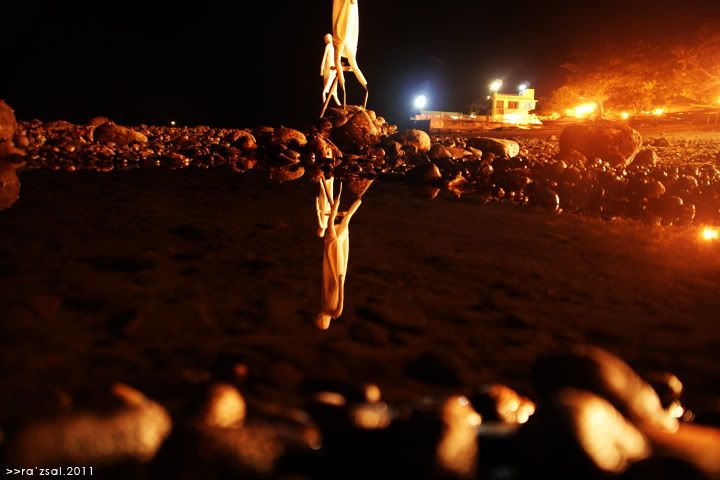
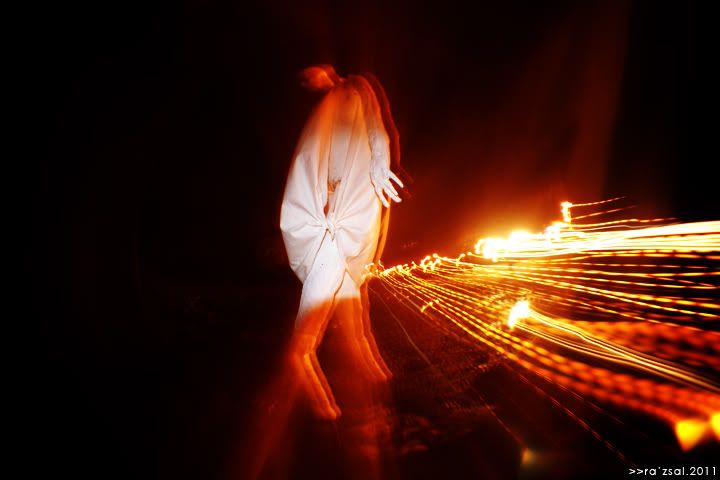
These
tamawos on the sea, ghostly white and faceless, are somewhat of an indifferent sort: these ones turn their back to us observing them from along the shore or along the cemented walkways of the seaside promenade. Their frozen walk simulates that attentive grazing of shore in lookout for what's hidden beneath sand and beach rocks. They also seem inattentive even of each other, and that stance, looking out (but barely) into the dark vastness and oblivion of the Tañon Strait, seems sad and forlorn and beautiful and evocative of what life can be found in this lively, isolating stretch of this lovely, sad, small city. I can now imagine these figures, once the klieg lights that illuminate them are turned off, to seem ephemeral and lost in the Dumaguete darkness. And what of them in the light of morning tide? Figures wading chest-deep, still inattentive to the fact of the possibility of drowning.
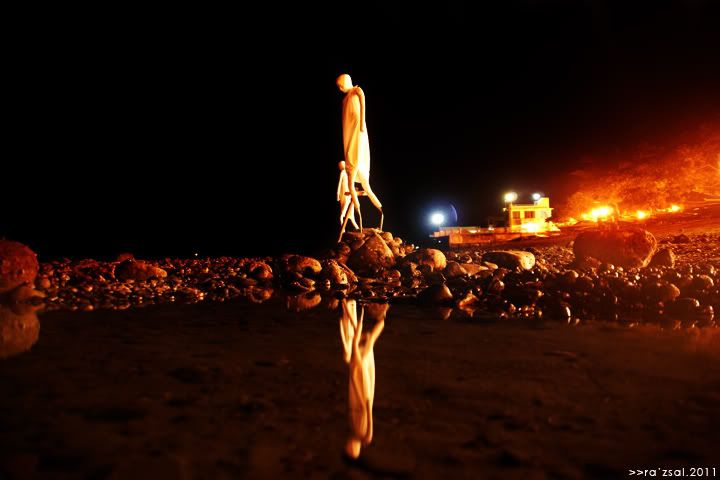 Photography by Razceljan Salvarita.
Photography by Razceljan Salvarita.Labels: art and culture, dumaguete, negros, photography, travel
[0] This is Where You Bite the Sandwich
Thursday, June 09, 2011
 11:36 PM |
The Music That Speaks For You
11:36 PM |
The Music That Speaks For You
Ah, my life thus far. The universe does mix it up for you, doesn't it. It puts in a measure of melancholy even in times of triumphs. Maybe it's to remind you that life is really an orchestra of sorts -- it takes all kinds of instruments to make the music hum the way it should.
I use music as a metaphor here because it seems to be the best refuge of all: it speaks for you. Without overly sentimentalizing it, your favorite music does carry your hopes and your loves and your devastations and your anger quite efficiently, and amplifies for you the exquisite drama of it all -- your own soundtrack to a private psychoanalysis, so to speak.

Right now, I am sad and I am drowning the things around me with sound only I can hear and that seeps to my bones like a beautiful kind of anger. I'm listening to The Temper Trap's
Conditions album. Their music telegraphs for me an urgency in their beat that underlines a kind of bittersweet knowing. "Drum Song," to cite a particular track, is majestic in its score -- an achingly danceable bit that somehow urges you to reach from deep down, from those recesses of sorrow, all that manic energy urging you to dance and dance and dance -- perhaps on your own, in the solo comforts of your own room -- until everything, all that pain, flings away from you, or gets reduced to a dull throbbing in your chest that you mistake for your heart, the sweat that you wipe away and the breathlessness that you feel being
everything that constitute a vocabulary for some things you desperately want to say -- or shout. To shout out, for example, that you love him but he does not care.
But you don't shout.
You just dance and dance and dance instead, the music becomes your dervish, the pain something you tell yourself you will have to live with like the endless refrain of a stupid, marvelous song.
Labels: life, love, music
[0] This is Where You Bite the Sandwich
Monday, June 06, 2011
 1:45 AM |
Dumaguete State of Mind
1:45 AM |
Dumaguete State of Mind
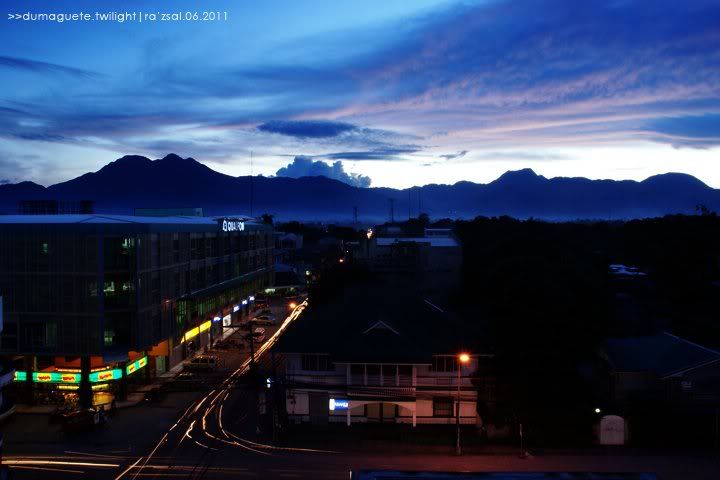 Photography by Razceljan Salvarita.
Photography by Razceljan Salvarita. Here is the city in darkness and light. A lit call center and an unlit ancestral house of the Pastor sisters across the street from each other. The Dumaguete streets at dusk darkening against the setting sky, with the Cuernos de Negros in the distance.
Labels: dumaguete, negros, photography
[2] This is Where You Bite the Sandwich
Sunday, June 05, 2011
 9:16 PM |
The Moments in The Hours
9:16 PM |
The Moments in The Hours
I have been thinking a lot about Virginia Woolf lately, for some reason. But only in the most random of ways. I'd be listening to Cesar Ruiz Aquino talking about the modernists, for example, and he'd mention the Bloomsbury Group -- although apparently he does not think much about Woolf herself. I'd be reading a literary blog and I'd come across an argument about who was the better modernist writer, Woolf or James Joyce? I'd be walking one morning down a street in Dumaguete, and I'd see a woman with a bouquet of flowers in her arms, waiting for a tricycle, and I'd think: "How very Mrs. Dalloway." And then I'd remember those days in the late 1990s when I'd sit in the grass somewhere in Tokyo and I'd read the perplexing book about the minutiae of a day in a sad woman's life. (I miss and envy those days.) I'd skim through YouTube and stumble on Tilda Swinton playing the gender-bending title character of
Orlando, based on Woolf's elaborate "love letter" of a novel to Vita Sackville-West. Sometimes, I'd go around the house and stumble on my copy of Michael Cunningham's
The Hours -- and I would tell myself: I have not seen Stephen Daldry's 2002 film adaptation for almost a decade now. When it first came out, I remember that it left me cold -- and I wondered: after having lived the life I've lived since then, will it find new resonance in me?
Yesterday, finally, I found in Facebook a link to
this article by Cunningham in
The Guardian. It felt as if the universe was compelling me to do something about this.
Today, unlike Mrs. Dalloway, I woke up quite late. But thoughtful, conscious of the minutes. I still managed to wring out a good day out of this Sunday which involved the readings of essays by Octavio Paz and F. Scott Fitzgerald and Ralph Ellison and such. There were sudden encounters and talks with a couple of friends. There was a walk around town under the wicked June half moon. There was the "unveiling" of a new art installation of
tamawos -- mythical elementals -- off the Boulevard. And then I went home to watch
The Hours.
It moved me afresh, and I think I understand this film much more now, being able now to see the depths of each of these women's unhappiness without a center -- Nicole Kidman's Virginia Woolf, Julianne Moore's Laura Brown, and Meryl Streep's Clarissa Vaughan. Sometimes the years do that: they make you see things your own youth cannot comprehend. What is life after ordinary madness and adult compromises? How does one deal with the sorrows of being trapped in a place you have no wish to be in, even when it includes the love of so many people? How does one recognize happiness, or does that recognition only come in hindsight?
There is a scene in
The Hours between Meryl Streep's Clarissa and Claire Danes' Julia Vaughan that underscores for me something that I have been trying to understand and come to terms with recently -- like a belated answer or explanation to some of the things I am doing, and yet have found no way to explain. In this scene, Clarissa is preparing for a dinner party for a great poet friend, and her encounter with him early in the day has left her devastated -- but also thoughtful. She has been crying since then, and then her daughter Julia enters, and asks her if she is all right. They retire to the bedroom and then they start to talk...
 Clarissa Vaughan:
Clarissa Vaughan: ... If you say to me, "When were you happy...?"
Julia Vaughan: Mom...
Clarissa Vaughan: ... Tell me the moment you were happiest...
Julia Vaughan: I know ... I know, it was years ago.
Clarissa Vaughan: Yeah.
Julia Vaughan: All you're saying is, you were once young.
Clarissa Vaughan: (Smiles and laughs.) I remember one morning, getting up at dawn, there was such a sense of possibility. You know, that feeling? And I remember thinking to myself, so this is the beginning of happiness. This is where it starts. And of course there will always be more.
(Both laugh.) Never occurred to me it wasn't the beginning, it was happiness. It was The Moment. Right then.
And I understood, and suddenly I so wished that when I was much younger someone had taken me by the shoulders, shook me, and told me: "Live every bit of these moments. You are young. When you're older, these things will define every bit of what you will remember to be happy." Then again, when we were younger, did we ever listen? Alas, no. Youth is too preoccupied with what it thinks is the singularity of its angst. "You don't understand," we all say. But of course we soon understand that they
understood. Because we've all been there.
But I am thinking more about my mother, actually. She is in her mid-70s. She's in L.A., and because of her age, she can't really move around so much because she tires out easily even when she tries to be brave about it. And sometimes I ask myself:
what made her wait for so long to see the world? When she was in her teens, she made
tira-tira to sell just so she could escape the stifling smallness of Bayawan town, where she was born, and dared go to evil Cebu, where, she was warned by her spinster aunts, she was likely to be "devoured." But she did it. She was so brave then -- and then not much else. She married. She stopped the dream of becoming a nurse. She married, and she had children.
Was it us? Was it the task of bringing up six boys? Was she happy?
Am I overreading The Hours?
Labels: books, family, film, life, love, quotes, writers
[1] This is Where You Bite the Sandwich
Thursday, June 02, 2011
 9:42 PM |
The Sound of Feet Running in Place
9:42 PM |
The Sound of Feet Running in Place
This is a post about gym, but let me start by saying that things sometimes begin because of heartbreak.
In 2008, at the tail-end of living another life, I was weighing close to 185 pounds, the heaviest I have ever been. I was, for lack of a better term, fat. The bulges were generous and spread out everywhere in my body like sly interlopers—they became stubborn residents; my belly was a balloon; my face was a rotund ball without angles; my breathing caught at the mere sight of staircases. I lost my cheekbones.
I used to be a skinny college kid, prey of the common wind, which could topple my thin frame over with a single blow. I had always been thin, and then just like that, I was fat. The slow road to obesity does not contain signposts. No warnings. The destination just happens. One day you try to tie your shoelaces and that simplest act becomes—to your utter surprise—a rigorous Olympic event.
But you get used to the heaviness over time. Its companion—an abundance of delicious food devoured indiscriminately, like one would feast on love—is a darling comforter. And sometimes food is there not just to sate physical hunger but something more. An unacknowledged craving for what one can’t have, perhaps, or a panacea for a hungry hurt. Sometimes food can take place of communication: you and your old lover, you have nothing anymore to talk about, and to fill in the gnawing silence, you go to a 24-hour diner and feast in shared delight over a sinful after-midnight meal. When that happens three or four nights every week, there is nothing else to expect except the growing blubber on your sides they have knowingly named after the handling of love. There are still incriminating photos and videos of me online that speak of that time—a strange figure who sounds exactly like me, but looks…different. Looking at an old Dumaguete episode of QTV’s
Ang Pinaka…, for example, I see a guy bearing my name and my voice, but he’s darker, rounder. And sometimes my current heart aches for that guy—I know what he was living through. What I remember about that time is a kind of “comfortable” darkness. The weight I found myself in existed as a kind of symptom to what was going inside. I was, still am, a comfort binger. My weight is twin to sadness.
Before 2008 was over, a necessary breakup. (Even that comes saddled with pain.) In the haze of those December days that followed, I crawled the streets like a lost caterpillar. I was in Don Atilano one day, enjoying a cup of coffee, and an old friend dropped by. One
beso beso later, I was told: “I met [named withheld]! Are you both okay now? I met the new boyfriend!”
A new boyfriend? I thought.
Less than a week after we broke up? My heart sank. But this is my point after this long introduction: I remember picking up my bag; I remember going home fast, following a compulsion and energy new to me; I remember changing clothes; and then I remember heading straight to gym. Under the white-lights of Cellutrim, confronting the reflection in the wall of mirrors, I swore never to be fat again.
What was gym for me? A refuge. It was my sanctuary that afforded me a time and a place to let go, for two hours each day, the painful cares of the world. It “gave” me permission to focus on myself for once. Gym took me in, blubber and all—and I was promised that, with due concentration and sweaty hard work, there would be transformation. I took that as cue to healing. Shedding the pounds was shedding the pain bit by bit. I could tell you I went to the gym for health reasons, but that would be a lie. Being fit was just a wonderful side-effect to nursing a broken heart.
This is why I like gym, and why I still go to the gym, even when sometimes life happens and there are intermissions when focus becomes lost and some pounds come raging back. But I return to it time and again, knowing full well that this how physically I can claim some form of steadfastness to a life that has a tendency for tattering.
Cellutrim, ran by the Sy family, was a good place to begin, and perhaps it still is. At that time, it was the best fitness center in town, and helped me find a good program that identified the body’s muscular regions to develop. “I don’t want muscles,” I told the instructor, “I just want to lose weight.” Cellutrim taught me the basics, although not much the proper form (the instructor, I soon found, was just too busy to tell me what was proper or not). It was a small gym, but it felt like family—and it was there that I got into what is now a familiar rhythm in gym culture: the fraught traffic for the cardio machines; the rudeness of certain foreigners who come in the early morning; the parade of carefully made-up
matronas who come not really to work out but to chatter, the machines becoming their own version of the water cooler; the heavy grunts of metal fetishists; the leaner gym bunnies infatuated with mirrors; the endless skirmishes with various kinds of body odor; the constant talk about supplements and protein shakes and the like; the love-hate relationship with the weighing scale; the constant presence of body ache, which you learn to long for.
Less than a year later, I transferred to Fit for Life, ran by the Arzaga family, located at the top floor of Bandera Building. It was in a bigger space, after all; no jostling here. The machines were plentiful; no traffic here, either. And there was the exquisite view of Dumaguete from the top of the world. Have you ever pounded on the treadmill with a view of sky changing colors as day turns to dusk? It adds poetry to your craving for sweat. I met Pete here, my instructor, who told me the way to go for a better fit is a knowledge of form. That one can lift a particular load forever but without doing it right in the correct form, the effort was practically useless. Once I had been doing some lifting for a chest exercise, and found the 70-pound load effortless. “You’re doing it wrong,” he said. “Do it this way.” He demonstrated the correct form for me. And when I did it myself, there was the sudden rush of exquisite pain, totally unfamiliar, something that had the feel of chili and tamarind.
“Halang ba?” he grinned. I grinned back.
All in all, I lost 34 pounds.
I go to World Fitness now, on the third floor of Portal West, where Pete has relocated. The gym is owned by two Swiss men—Hans Jorge Schallenberg and Christian Gafner—and for more than a month now, they have opened the gym’s doors for free to anyone wishing to use its premises, pending the final issuance of a permit—but also, in a sense, giving the casual gym bunny a chance to sample the place. What better advertising is there? (And being law-abiding Swiss people, they won’t let anyone pay the fee unless there is an official go-signal to start the business. It has been two months now. And I ask: is this how business can get strangled by the slowness of our bureaucracy?)
I have transferred because the gym is nearer where I live and where I work, and it is also newer, slicker, and wider than the last gym I attended. Sometimes those things do matter.
Almost every day, as much as my schedule can accommodate, I find myself there, waiting to take my turn at running the treadmill. Around me, there are the familiar sounds of people grunting, of metal plates making contact, of dumbbells being dropped on the cushioned floor… When I finally get to run, as the sweat trails across my face and everywhere else, I remember why I’ve been running the treadmill in the first place. Among other sacred places in life, gym was where you go to find yourself. For fitness, or for forgetting what pains you, this is where one kind of transformation can happen. And sometimes that is enough.
Labels: fitness, life, love
[1] This is Where You Bite the Sandwich
 7:15 PM |
The Uses of Anger
7:15 PM |
The Uses of Anger
Have better uses of your anger.
Learn to like, for example, how it clarifies
Sometimes what passes for sunsets,
And what sounds like a child
Crying in the dark. Mysterious
Things hide in cool
Running waters. They are not
Fish. Believe
That sometimes everything else
Clouds things as they are.
Learn to seethe.
Make that your oxygen.
Labels: life, poetry
[0] This is Where You Bite the Sandwich
Wednesday, June 01, 2011
I don't know why it must be that my occasional happiness always seems to hinge on the knowledge -- which I sometimes willfully deny, the way the moon ignores the darkness in which it must shine -- that I love you. And that I know you do think of me, sometimes. Perhaps accidentally, like a stray thought, more than anything else. And in those moments when we both cannot deny there is this secret world we share, I am most happy.
Labels: life, love
[0] This is Where You Bite the Sandwich
 3:45 PM |
Small Wishes
3:45 PM |
Small Wishes
There are small things in life that I constantly wish for.
Masahistas who don't constantly look into their cellphones during your massage, for example. Or security guards who don't do their small person's sense of power play. Waitresses who know the exquisite details of the food they are serving. Waiters who actually wait. Teachers who do not treat their classrooms as a version of
TMZ, or a Bible study session. Tricycle drivers who wear deodorant. Taxi drivers who do not ask you for directions, or the best way towards your destination, especially in a strange city. Doctors or nurses who have impeccable bedside manners. BPO agents who speak English well. What do I ask for? For people to do their jobs, and to do them well. Anything less is just a complete and perfect waste of our time.
Labels: life
[0] This is Where You Bite the Sandwich
 1:41 PM |
Life in Another Fishbowl
1:41 PM |
Life in Another Fishbowl

I love Curtis Sittenfeld's
Prep. I love how this book is so engaging and delicious, like a perfectly heaped cone of vanilla and chocolate ice cream on a hot summer day. I love its sardonic but wise tone -- that of a woman in her late 20s recalling the angst-ridden minutiae of matriculating in a preppy boarding school in the East Coast, far from the rough and LMC upbringing of South Bend, Indiana. The novel, which is in many ways epic, has the feel and intimacy of a short story -- and Sittenfeld wisely cultivates that feeling by sectioning off her narrative of four years in the life of one Lee Fiora into set pieces, each one an immersive demonstration of a mood and a reflection on high school politics and romances, always with a deep and special knowing of people, places, rituals, and emotions. What keep it grounded are the all-too-human flaws of our heroine -- she is smart and observant, at first painfully shy, often bitter, often unwise, always insecure, constantly flailing to find her place in a universe of seemingly perfect people and circumstances. The book knows human nature so much, and yet also constantly surprises, and does so in prose that is littered with devastating insights, such as this: "There are people we treat wrong, and later, we’re prepared to treat other people right. Perhaps this sounds mercenary, but I feel grateful for these trial relationships, and I would like to think it all evens out — surely, unknowingly, I have served as practice for other people.” Not a lot of books leave me breathless. This is one of them.
Labels: books
[0] This is Where You Bite the Sandwich
 12:57 PM |
Adventures in Caricatures and Blind Direction in a Story of a Regatta
12:57 PM |
Adventures in Caricatures and Blind Direction in a Story of a Regatta
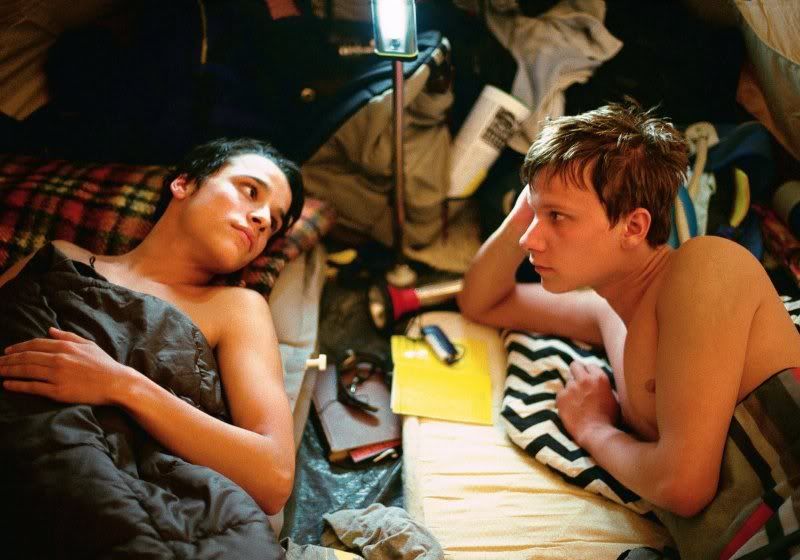
Marco Kreuzpaintner's
Sommersturm [
Summer Storm, 2004] is an illustration of two persistent (but certainly not new) ideas: that art's potential greatness lies in the execution more than the message (how very Jose Garcia Villa), and that (as a refinement of the previous), if there must be message, a certainty of that message is required, or else we lose interest. I simply cannot care for the haphazard, for the hodge-podge, especially if the mess is not the message. Here is a story, for example, of a young German boy named Tobi [the uninteresting Robert Standlober, who lacks gravitas]. He is the captain of a rowing crew, and he is secretly enamored by his best friend and teammate Achim [the underused but superb Kostja Ullman]. It is all secret ache and hetero bluffing, with Tobi eventually flirting around with another teammate named Anke [Alicja Bachleda-Curuś] -- until the team finally heads out to the German countryside to train and compete in a rowing regatta for the summer. A gay rowing team arrives and soon begins stirring the simmering sexual tension growing in a camp full of teenage hormones -- soon forcing Tobi to confront his sexuality and attraction towards Achim, all against the backdrop of the titular sudden summer storm. In summary, the narrative seems tidy, but Kreuzpaintner, working from a script co-written by Thomas Bahmann, barges into this story with the sense of direction of a blind man. He creates caricatures out of both gays and straights, dives into meaningless subplots (the flirtation between the rowing coaches), and indulges into senseless mise-en-scenes (the elaborately-staged sex scene between Achim and his girlfriend Sandra, in a quaintly grassy part of the forest, at night, in the middle of a search for a lost camper, in the middle of a storm). Everyone is a stock and flat stereotype supposedly to telegraph the message more -- but what message? That homophobia is common and can only be cured by association with gay men? That unrequited love hurts, and it is foolish to fall in love with your straight best friend? That it is wrong to treat a girl as a mustache? That camaraderie is won by denial? That it is easy to forgive and forget just because the film is ending? Any one of these can be made into an interesting film, and in fact, has been. Not in this film, though. This is a film where everything is spoonfed to you -- yet everything still does not make sense for some reason. There is no shred of human reality in this film. This is a complete and utter waste of time.
Labels: film, queer, sports
[0] This is Where You Bite the Sandwich
GO TO OLDER POSTS
GO TO NEWER POSTS

















 6:41 PM |
Launch of The Anvil Jose Rizal Reader
6:41 PM |
Launch of The Anvil Jose Rizal Reader

 5:32 PM |
A Decade of Sound and Dancing (and Zombie) on Hump Day
5:32 PM |
A Decade of Sound and Dancing (and Zombie) on Hump Day



 5:16 AM |
Some Sadness
5:16 AM |
Some Sadness
 2:55 PM |
My Father in a Measure of Memory
2:55 PM |
My Father in a Measure of Memory
 Years ago, I was asked by the writers Gémino H. Abad and Alfred Yuson to submit to an anthology of poetry about fathers and fatherhood in the aptly titled Father Poems (Anvil, 2004). That project, I think, was timed for a Father’s Day release.
Years ago, I was asked by the writers Gémino H. Abad and Alfred Yuson to submit to an anthology of poetry about fathers and fatherhood in the aptly titled Father Poems (Anvil, 2004). That project, I think, was timed for a Father’s Day release.  4:21 PM |
Nabiyaang Tamawo
4:21 PM |
Nabiyaang Tamawo




 11:36 PM |
The Music That Speaks For You
11:36 PM |
The Music That Speaks For You

 1:45 AM |
Dumaguete State of Mind
1:45 AM |
Dumaguete State of Mind

 9:16 PM |
The Moments in The Hours
9:16 PM |
The Moments in The Hours

 9:42 PM |
The Sound of Feet Running in Place
9:42 PM |
The Sound of Feet Running in Place
 7:15 PM |
The Uses of Anger
7:15 PM |
The Uses of Anger
 3:53 PM |
Dark Joys
3:53 PM |
Dark Joys
 3:45 PM |
Small Wishes
3:45 PM |
Small Wishes
 1:41 PM |
Life in Another Fishbowl
1:41 PM |
Life in Another Fishbowl
 I love Curtis Sittenfeld's Prep. I love how this book is so engaging and delicious, like a perfectly heaped cone of vanilla and chocolate ice cream on a hot summer day. I love its sardonic but wise tone -- that of a woman in her late 20s recalling the angst-ridden minutiae of matriculating in a preppy boarding school in the East Coast, far from the rough and LMC upbringing of South Bend, Indiana. The novel, which is in many ways epic, has the feel and intimacy of a short story -- and Sittenfeld wisely cultivates that feeling by sectioning off her narrative of four years in the life of one Lee Fiora into set pieces, each one an immersive demonstration of a mood and a reflection on high school politics and romances, always with a deep and special knowing of people, places, rituals, and emotions. What keep it grounded are the all-too-human flaws of our heroine -- she is smart and observant, at first painfully shy, often bitter, often unwise, always insecure, constantly flailing to find her place in a universe of seemingly perfect people and circumstances. The book knows human nature so much, and yet also constantly surprises, and does so in prose that is littered with devastating insights, such as this: "There are people we treat wrong, and later, we’re prepared to treat other people right. Perhaps this sounds mercenary, but I feel grateful for these trial relationships, and I would like to think it all evens out — surely, unknowingly, I have served as practice for other people.” Not a lot of books leave me breathless. This is one of them.
I love Curtis Sittenfeld's Prep. I love how this book is so engaging and delicious, like a perfectly heaped cone of vanilla and chocolate ice cream on a hot summer day. I love its sardonic but wise tone -- that of a woman in her late 20s recalling the angst-ridden minutiae of matriculating in a preppy boarding school in the East Coast, far from the rough and LMC upbringing of South Bend, Indiana. The novel, which is in many ways epic, has the feel and intimacy of a short story -- and Sittenfeld wisely cultivates that feeling by sectioning off her narrative of four years in the life of one Lee Fiora into set pieces, each one an immersive demonstration of a mood and a reflection on high school politics and romances, always with a deep and special knowing of people, places, rituals, and emotions. What keep it grounded are the all-too-human flaws of our heroine -- she is smart and observant, at first painfully shy, often bitter, often unwise, always insecure, constantly flailing to find her place in a universe of seemingly perfect people and circumstances. The book knows human nature so much, and yet also constantly surprises, and does so in prose that is littered with devastating insights, such as this: "There are people we treat wrong, and later, we’re prepared to treat other people right. Perhaps this sounds mercenary, but I feel grateful for these trial relationships, and I would like to think it all evens out — surely, unknowingly, I have served as practice for other people.” Not a lot of books leave me breathless. This is one of them. 12:57 PM |
Adventures in Caricatures and Blind Direction in a Story of a Regatta
12:57 PM |
Adventures in Caricatures and Blind Direction in a Story of a Regatta
